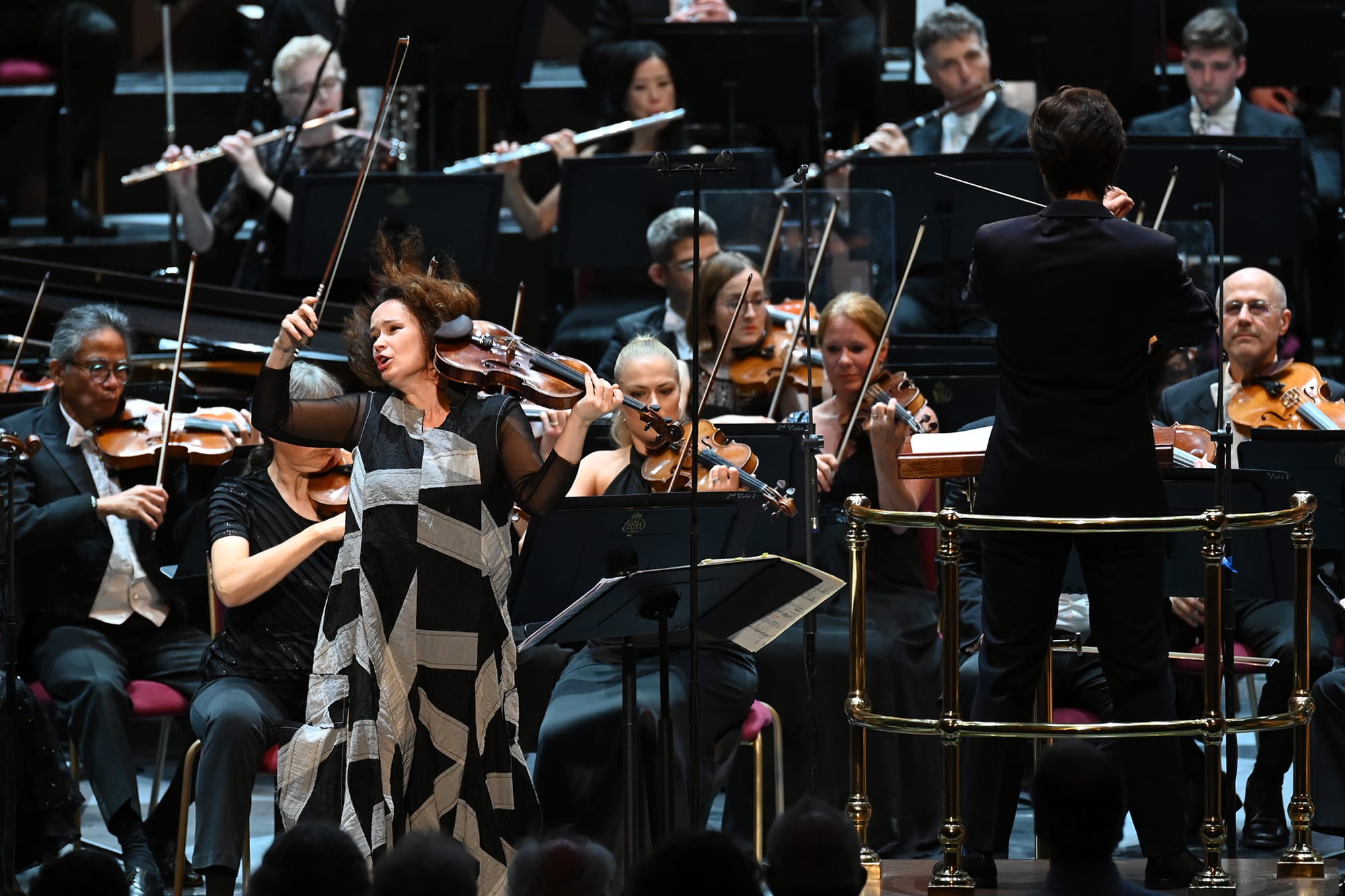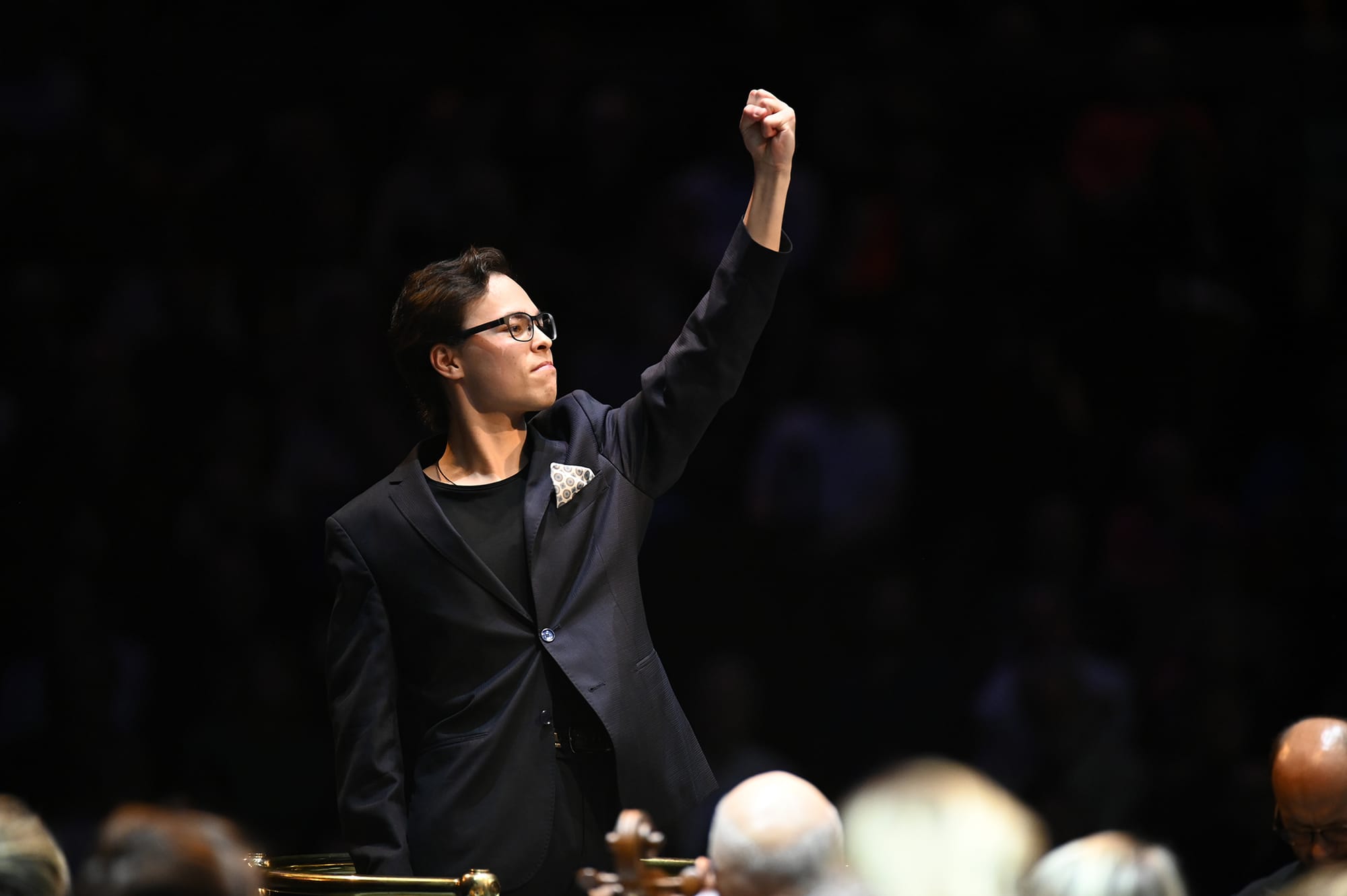Patricia Kopatchinskaja plays Schonberg

PROM 67 Vaughan Williams, Schoenberg, Shostakovich Patricia Kopatchinskaja (violin); BBC Symphony Orchestra / Tarmo Peltokoski (conductor). Royal Albert Hall, London, 09.09.2024
Vaughan Williams Fantasia on ‘Greensleeves’ (1934)
Schoenberg Violin Concerto, Op. 36 (1935/6)
Shostakovich Symphony No. 5 in D minor, Op. 47 (1937)
Three very different types of music form the 1930’s were presented here via three pieces all composed within a three-year span (1934-37): Vaughan Williams’ oh-so-English Fantasia on ‘Greensleeves’, Schoenberg’s unforgiving yet magnificent post-tonal Violin Concerto, and Shostakovich’s ever-popular (and ever-enigmatic) Fifth Symphony.
Two out of three might seem familiar to most listeners, the Vaughan Williams and the Shostakovich. And yet how we hear music is coloured by what music is around them: after Vaughan Williams’ pastoral reclinings, do we sit with even straighter back for the Schoenberg, is it moreor less of a challenge? Does the Shostakovich feel like easy-listening, suddenly, after the Schoenberg?
That all three works were etched individually, their soundworlds honoured, and each was chock-full of revelations, is testament to the skills of the young Finnish conductor Tarmo Peltokoski. Anyone who has heard his DG recording of Mozart Symphonies with the Deutsche Kammerphilharmonie would have had a least an inkling of this Sibelius Academy-trained Wunderkind (for such, it turns out, he is – and later this month he becomes Music Director of the Orchestre National du Capitole de Toulouse. They are lucky to have him. So search out the Mozart disc: the violins decorate lines on repetition in the slow movement of the ‘Haffner,’ for example, much like a singer would.
Straightforward, no-nonsense conducing resulted in a straightforward, no-nonsense Greensleeves (as the Proms booklet points out, the piece is actually an arrangement by Ralph Greeves (1889-1968). Peltokoski’s approach was certainly refreshing; the piece remains impeccably English in demeanour however, and so acted in maximal contras toto Schoenberg’s complex processes.
Patricia Kopatchinskaja seems to always deliver in her guise as a whirling dervish of a violinist. Understandably, she used a score for Schoenberg’s mid-thirties Concerto, but nevertheless seemed to remain free from it; most impressively, together with Peltokoski, she brought out the score’s shadows of dance. Peltokoski’s precision of beat was a boon here, the orchestra absolutely with the soloist, while PatKop’s virtuosity showed Schoenberg’s ferocious solo par in the best possible light (I have been present at a recording session for this piece – Jack Liebeck’s recording – and can ates to the difficulties the score presents). After the slightly objectivised Vaughan Williams, somehow the Schoenberg sounded like a progression (albeit a substantial one) rather than an opposition.
Perhaps there could have been more ‘grazioso’ about the central movement (‘Andante grazioso’) but the music remained magnificently elusive, rising to a most impassioned G-string passage from Kopatchinskaja;. more than this, the dovetailing between soloist and orchestra was exceptional. The finale, merely marked ‘Allegro,’ took us to a markedly different plane, a knife edge between power and humour. Hering a trombone line, angular and strong, surely indicated that the Haupstimmen were being honoured (sadly I am without score on this one); against that angularity were massively Romanticised gestures from Kopatchinskaja. While there have been previous performances of this piece at the Proms (more than one might expect, perhaps), this one was surely one the finest.
Two encores: Kancheli’s Ragtime (dedicated to Gidon Kremer), delivered by Kopatchinskaja with Peltokoski on the piano, full of character, and Crin by Jorge Sanchez-Chiong, a remarkable piece for voice and violin (both parts executed, with abandon, by Kopatchinskaja).

Finally, Shostakovich’s most famous symphony, the Fifth. Discipline was once more the order of the day, the BBCSO’s first violins preternaturally together for that slow-moving melody early on. Dynamics reached the barely-audible: Peltokoski obviously insists on the full dynamic spectrum. Solo contributions were exceptional throughout, not least the horn and flute duet (Martin Owen floating the high played B-natural beautifully), and some lovely bassoon contributions from Tod Gibson-Cornish. Leader Igor Yusefovich shone in the Scherzo/Allegretto, a movement of huge character (here was also a delicious contrabassoon moment from Claire Webster).
The Largo was the finest performance of this movement I have heard for a long time, perfectly paced and with the conductor showing perfect harmonic understanding. Rarely have the BBC SO’s string sounded so glowing; Tom Blomfield’s plaintive oboe solos cut to the heart. Pretty much everybody thinks they know this movement: Peltokoski persuaded us we had only previously touched the surface, including hhighlighing of a remarkable clarinet and bassoon chorale. As to the finale, this was intelligence in the service of fire: a horn sang out in a moment that seemed to look back to Stravinsky’s Firebird, more previously unthought-of correspondences. Refusing to give in to adrenalin, Peltokoski paced the approach to the end to perfection.
A remarkable Prom. I imagine Peltokoski’s approach might not suit all tastes, but his wayis, to me at least, a breath of fresh air.
Here's Peltokoski with teh Orchestre Philharmonique de Radio France in some more Shostakovich: the Festive Overture:
All photos © BBC / Chris Christodoulou
